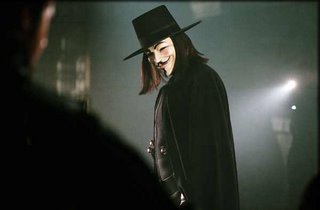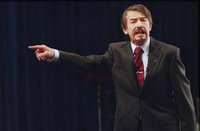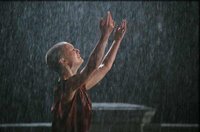
V for Vendetta (2005)
Director: James McTeigue
V for Vendetta is one of the most talked-about new movies of the year. So why am I talking about it? Don’t I usually champion the overlooked film, the ancient film, the foreign film that Americans don’t want to read? Of course I do, and that’s why I’m not going to give you the kind of review of this film that other outlets have. Forget all the fanboy details about who wrote what and who disowned what. Forget about the Ebert/Academy Award for the message film that “may just change the world.” If V for Vendetta has a message to deliver, it’s that we just love a down and dirty game of good cop/bad cop.
First off, I want to say that I liked V for Vendetta. I thought Natalie Portman was convincingly scared as Evey, and the shaved head showed off her lovely, swanlike neck. Hugo Weaving showed a surprising range of attitude and emotion even though he spent 100% of his time behind a mask. Bu
 t I liked Michael Radford’s Nineteen Eighty-Four (1984), too, also set in London and, perhaps not coincidentally, also starring John Hurt. Hurt played the rule-breaking minion in a totalitarian society in the latter film; in V for Vendetta, he plays the rabid dictator. See what I mean? Good cop/bad cop.
t I liked Michael Radford’s Nineteen Eighty-Four (1984), too, also set in London and, perhaps not coincidentally, also starring John Hurt. Hurt played the rule-breaking minion in a totalitarian society in the latter film; in V for Vendetta, he plays the rabid dictator. See what I mean? Good cop/bad cop.The biggest difference between these films is the existence of the superantihero V. The new film was made from a comic book, I mean graphic novel, after all. V is a cross between the darker version of Batman and the accidentally power-endowed Spider-Man. V means to get revenge on the people who disappeared him behind prison walls and tortured him, Josef Mengele style, in the name of science. He also wants to bring down the world his tormenters have created, a world of surveillance and fear. The parallel with the Bush Administration certainly couldn’t have been lost on the liberals who flocked to this film, but what of the conservatives? They just wanted to see things get blown up and blood spurt out of people's necks. Truth to tell, so did the liberals.
I note that Roger Ebert in his backhanded three-star review of V for Vendetta thought that blowing up Parliament was a real shame because it’s such an historic, old building. Some other reviewer thought the scene was in poor taste given the somewhat-recent London subway bombing. I say, “It’s an imaginary building on a flat screen, and V took care to ensure that no one would be in the building anyway.” Watching explosions is very entertaining. That’s why a planned building collapse shows up on the TV news whenever one occurs. Notice the cheers that follow the implosion. We like destruction.
 But I do think a lesson can be learned from this movie. Terrorists, insurgents, rebels, freedom fighters, whatever you want to call them, are made in the forge of state cruelty. V was made in a government prison, and he made Evey the same way, ending her conversion with a baptism in the rain. It is important to remember that governments make terrorists who work for them every bit as much as they make terrorists who work against them—they are called soldiers. Good cop/bad cop. If you think force is sometimes necessary, make sure you know what you're fighting against and why—because cruelty started by a state never really ends. It just grows a few more Vs. l
But I do think a lesson can be learned from this movie. Terrorists, insurgents, rebels, freedom fighters, whatever you want to call them, are made in the forge of state cruelty. V was made in a government prison, and he made Evey the same way, ending her conversion with a baptism in the rain. It is important to remember that governments make terrorists who work for them every bit as much as they make terrorists who work against them—they are called soldiers. Good cop/bad cop. If you think force is sometimes necessary, make sure you know what you're fighting against and why—because cruelty started by a state never really ends. It just grows a few more Vs. l


12 Comments:
At 10:57 PM, Anonymous said…
Anonymous said…
Ah yes, the intellectually challenging and thought-provoking work of the Wachowski Bros. Or; let's grind everything into metaphorical toothpaste and hope an actor speaks it impressively enough to fool undergrad film geeks into thinking it's stimulating and philosophically consequential as well as being kick-ass entertainment. Unfortunately I find precious little thought or entertainment in their mighty schlock. I still want my money back from The Matrix films and if I ever watch V For Vendetta it would strictly be for Natalie.
At 9:09 AM, Marilyn said…
Marilyn said…
I couldn't agree more. I was utterly puzzled by all the deconstruction of the Matrix. It was about as profound as a hole in the ground. It is important to know that films based on comic books really tie into the whole 13-year-old adolescent developmental stage. Straining toward adult freedom, testing of physical prowess, and innocent and fearful acknowledgment of the opposite sex. V for Vendetta fills the bill right down the line. Taken on that level, it's pretty entertaining.
At 12:51 AM, Anonymous said…
Anonymous said…
I think that aspect of The Matrix phenomenon was pretty well analogous to the now-forgotten reception of the original Star Wars, which came out when a lot of '60s-'70s style transcendental philosophising, pseudo-scientific riff-raff like Von Daniken, California lite-religion etc was still popular, some took the whole "force" idea seriously. Alec Guinness told stories of screwballs who wanted him to become their guru. This despite the fact that it was just Lucas' catch-all fanboy explanation like the spice in Frank Herbert's Dune books, which of course is all modern viewers took it for. In much the same way, the Wachowskis glibly exploited some more contemporary urges - soft-core anarchist propaganda, computer zen, sophomore set texts on reality and consciousness - and whipped up in a thick coating of gleaming technocratic style, and hey presto, a perfect pop culture chymera.
At 8:26 AM, Marilyn said…
Marilyn said…
Still, one can't fault the desire of each generation to have its hero myth. As someone past that stage of life, I still find these films entertaining, even thrilling. V for Vendetta is much better than the Matrix simply because it has a much better, more coherent storyline.
At 5:57 PM, Anonymous said…
Anonymous said…
Totally argee about the shopworm ideas in The Matrix. But in terms of people taking the relious aspects of the orgininal Star Wars seriously, I think that's more the case today than it was at the time. Sure, we all went around saying "May the Force be with you" in '77, but when the last three episodes were coming out, news shows devoted time to Christian organizations worried about losing members to the "spiritual aspects" of Lucus' story. I was amazed to see these segments where preachers were explaining that it was fine to enjoy the movies, but to be wary of the false doctrines. This is surely one of the most bizarre things I ever saw on the news. Though maybe they were just trying to find a way to hype a new release and get a story out of it. One the other hand, there are people now who put "Jedi" down as their religion on questionnaires. I'm not sure if they are joking or not. Sadly, they aren't in their early teens.
It seems to me that everyone online I hear from dislikes V for Vendetta, while the people I meet in real life are recommending it. A funny reversal of the "computer geek" myth. The movie looks exciting visually, so I'll probably see it, but the story doesn't sound that interesting.
At 9:36 PM, Anonymous said…
Anonymous said…
The "put 'Jedi' down as your religion" movement started during a British census a few years back, not exactly a joke but also not quite serious, as an ironic culture-jammer movement to attack the perceived absurdity of mainstream religions by getting together enough numbers to get Jedi declared a proper religion. The quotient of tittering fanboys and actually goofy pseudo-religiose followers involved in that I know not.
As for the debates you mentioned, that seems to fit in fairly well with the fairly systematic attempt of modern mainstream Christian churches to actively engage with pop culture they perceive as stepping into their territory. Where their one-time approach was to maintain a stony tsk-tsk demeanour with pop culture, today they're actively playing the game of engagement and piggybacking. They increase their visibility and put across their message in direct relationship to phenomenons they know very well have enormous attention paid to them, and enormous amounts of meny spent on them. Witness the Harry Potter, Passion of the Christ, and Da Vinci Code debates.
If there really are people who take the idea of being a "Jedi" seriously I'd say it's because it's been around so long and it's a creation that inspires such deep, almost obsessional love from its aficionados. I feel the religious element of Star Wars was fundamentally more crucial in its original era than now is because no-one would dream it up now; it's an exact reflection of the kinds of mind-over-matter pseduo-philosophising so popular of the era it sprang from; now it's just about the only place where it survives. No-one these days, I don't think, would seriously try to create a new franchise with quite the same spin (given that, as I said, Lucas pinched the theme from Frank Herbert, Robert Heinlein, Philip K. Dick and a few of the other sci-fi writers who were themselves powerful intellectual influences on the Hippie movement).
The Matrix cleverly transferred the power fantasy into a digital realm, thus tapping into every latent fantasy of a certain very large social group.
Anyway, nice to see you, Joe. ;-)
At 10:23 PM, Anonymous said…
Anonymous said…
It's good to see you again, too. :-)
For some reason, I had trouble posting messages earlier. I have no idea why. Nice to be able to communicate again.
I think I'm not getting the differentiation you make between The Matrix and Star Wars that allows you to say "no one would ever try that again" when The Matrix did just that. I'm also not sure Lucas took the Force from Herbert or Dick, mainly because I don't think he'd need to. The whole Zen thing had been omnipresent in the sixties. It was everywhere. I don't know enough about Lucas to know what sci-fi authors he read (or if there were any). I always think of his sci-fi influences being entirely movie related.
You're right about the Jedi thing starting as a joke. I'd forgotten that. And I can't be sure how seriously the fans are taking that, either. A funny gag on, I think, Mad TV had two fanatics arguing about the Jedi philosophy and punctuating their remarks (even as they began to shout at each other) with "May the Force be with you." Me and some friends got in the habit of mimicking it afterwards ("What a nice day, may the force be with you." "Well, may the force be with you, it's okay, but I've seen bluer skies." "That may be true from your perspective, may the force be with you." It's funny for, like, twenty minutes.
At 11:00 PM, Marilyn said…
Marilyn said…
Nice to have you on the blog, Joe. Actually, Lucas was heavily influenced by the work of Joseph Campbell and was someone of an acolyte of Campbell's. He drew the Star Wars mythology from Campbell's study Hero of a Thousand Faces. Where his scifi influences came from is anyone's guess, but he may have taken any number of mythic sources of power to become his Force.
At 11:25 PM, Anonymous said…
Anonymous said…
Thanks, Marilyn.
I'd forgotten about the Joseph Campbell connection, but of course you're right.
At 12:11 AM, Anonymous said…
Anonymous said…
Joe;
Having read a lot of those books, I'm pretty darn sure of where Lucas was soaking up his influences. In general, I'd say Lucas' chief influences were very much in the early space opera writers - E.E. 'Doc' Smith, E.R. Burroughs - whose work was generally unfilmed except in the influence they had on the Buck Rogers and Flash Gordon serials. I am very sure he took the "Force" element from my already mentioned grouping of sci-fi writers. If you're familiar with Dune, you'll spot not just similar plot but similar intellectual patterns; he uses the spice and its intricate genetic-religious-social effects to justify a future universe that looks awfully like that in classical Arthurian romance. The Force serves a similar function. I don't think Lucas would have come up with the concept entriely by himself without such models, especially as Herbert was one of the very few sci-fi writers to take an interest in what a futuristic religion would look like (as opposed, to, say, Arthur C. Clarke, who used sci-fi to deconstruct religious impulses). Also, Herbert's writing is highly prescient in predicting the '60s idea of drug use as a consciousness-altering tool, something that struck me very forcefully when I read it.
Now, I didn't say "it couldn't happen again", just that, it happened again with variation. I doubt people would dig the flower child religious element of Star Wars as deeply as they did originally (and indeed, as the sequels showed, they didn't). The Matrix, to have reach a similar critical mass of hipster impact, reflected twists in the counterculture zeitgiest, which no longer holds that you can keep it from raining by thinking real hard. It moves the whole idea inside; into the digital realm, into a kind of narcissitic drug-user/technofascist neutral zone; it no longer proscribes a fantasy that projects mind-power onto a real world but allows physical power in an unreal world. In that fashion, I think, The Matrix represents that distinct shift in alt-thinking, and is one reason I didn't like the reek of it right from the start. The cardboard characters and sloppy plotting was another aspect, of course.
At 2:04 AM, Anonymous said…
Anonymous said…
I definately see the influence of Smith and Burroughs. But, again, I bet that comes more from Buck Rogers and Flash Gordon than the original books. I have to take you word about Herbert. I never read the Dune series
At 2:38 AM, Anonymous said…
Anonymous said…
Dune is an epic classic that neither David Lynch's film nor the recent mini-series do real justice to. Dune Messiah is a taut thriller. Children of Dune falls into the Return of the Jedi I've-run-out-of-new-ideas-so-I'll-repeat-myself trap, but it ties the story of the initial trilogy up fairly well. Beyond that, I have not yet read. All of them require a certain tolerance for purple dialogue and grandiose tendencies.
Post a Comment
<< Home